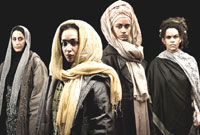
|
|||
|
|||
| Home |
| Gallery |
| Culture/ Technology |
| Fiction |
| Music |
| Poetry |
| Theater |
| What's New |
| About/Contact |
| Archive |
|
'The Bacchae of Baghdad' an uneven, confused ride Published March 2006 By Jim Trageser DUBLIN
If the ancients' earliest plays still provide relevant lessons for today's world, it speaks perhaps less to their prescience than to the enduring hubris of the human race. Euripides, who wrote frequently of war and its aftermath, is a recurring provider of contemporary theatrical productions. A few years back, San Diego's venerable Old Globe produced an updated version of "The Trojan Women." And now Dublin's Abbey Theatre is offering up a semi-updated version of "The Bacchae." "Semi-updated" indicates here that while the production is titled "The Bacchae of Baghdad," and while the set depicts Baghdad and the program notes excoriate the U.S. invasion/liberation of Iraq, writer/director Conall Morrison mostly leaves Euripides' work itself alone. Well, except for translating it from ancient Greek to modern English. (The Globe's 2000 production of "Trojan Women" featured a highly politicized re-writing that owed far more to "translator" Marianne McDonald than it did Euripedes.) The result is a bit disjointed at times – seeing Pentheus dressed as a contemporary American general while talking about Greek gods and witchcraft takes some serious suspension of disbelief. Likewise, having Dionysus looking like some sort of Rastafarian mystic is also a tad odd. Still, kudos to Morrison for mostly sticking true to Euripedes, rather than using the dead playwright's reputation to sell something new.
The actors take a game stab at making this hybrid of Middle Eastern set and classical Greek tragedy work. Jeff Diamond brings a needed gravity to Cadmus, and Andrea Irvine's grief as Agave is heartbreaking. Robert O'Mahoney does a credible Southern American accent as Pentheus; the transition from proud, arrogant warrior to simpering lackey is a bit abrupt, but O'Mahoney gives it probably more credibility than is in the script. On the show's second night, Christopher Simpson started off the play a bit over the top as Dionysus, but settled down quickly and turned in a powerful performance. And the production values in this play are fantastic. Upon entering the theater proper, one is greeted by the unmistakeable scent of incense – real incense, not the flowery hippie stuff so prevalent these days. And then you see the stage – Sabine Dargent's set re-creates the bombed-out hulk of a building in an urban Middle Eastern locale with an amazing feeling of grunge and dirt and horror. Utility wires hang from broken poles, floors sag where walls have fallen away; the set is a spectacle all to itself. Sinead Cuthbert's costumes have a timelessness about them – outside the American military uniforms, most of the costumes could be either from the long-ago or the far future. And yet, they work very well – bright and flowing, they have a Mideastern quality to them that matches the set. The lighting by Nick McCall accents the set seamlessly, and the uncredited sound adds more flair with its use of Middle Eastern music to break up scenes. In the end, though, the wonderful set and costumes can't hide what is a shaky connection between Euripedes and Iraq. Of course, Euripedes' words still ring true, even if they are delivered in a non-intuitive setting: Hubris afflicts us all, both those who adhere strictly to logic and those who rely on faith. If a bit of a stretch to tie that lesson directly to the U.S. and British military presence in the Mideast, to pit Western liberal secularism vs. Islam, there is a lesson to be found in Euripedes' words these many centuries later. It just seems the whole Baghdad thing was tossed in to sell more tickets. |
Copyright © Turbula.net

